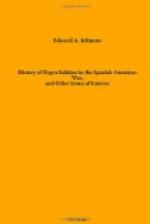The testimony continues:
Private Smith of the Seventy-first Volunteers, speaking about the impression his experience at Santiago had made upon him, said:
“I am a Southerner by birth, and I never thought much of the colored man. But, somewhat, now I feel very differently toward them, for I met them in camp, on the battle field and that’s where a man gets to know a man. I never saw such fighting as those Tenth Cavalry men did. They didn’t seem to know what fear was, and their battle hymn was, ’There’ll be a hot time in the old town to-night. That’s not a thrilling hymn to hear on the concert stage, but when you are lying in a trench with the smell of powder in your nose and the crack of rifles almost deafening you and bullets tearing up the ground around you like huge hailstones beating down the dirt, and you see before you a blockhouse from which there belches fourth the machine gun, pouring a torrent of leaden missiles, while from holes in the ground you see the leveled rifles of thousands of enemies that crack out death in ever-increasing succession and then you see a body of men go up that hill as if it were in drill, so solid do they keep their formation, and those men are yelling, ’There’ll be a hot time in the old town to-night,’ singing as if they liked their work, why, there’s an appropriateness in the tune that kind of makes your blood creep and your nerves to thrill and you want to get up and go ahead if you lose a limb in the attempt And that’s what those ‘niggers’ did. You just heard the Lieutenant say, ‘Men, will you follow me?’ and you hear a tremendous shout answer him, ‘You bet we will,’ and right up through that death-dealing storm you see men charge, that is, you see them until the darned Springfield rifle powder blinds you and hides them.”




